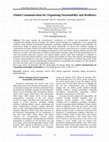Peer-reviewed Journal Articles by Ziyu Long

Guided by feminist politics of reinscription and intersectionality theory, this study theorized h... more Guided by feminist politics of reinscription and intersectionality theory, this study theorized how women entrepreneurs from China, Denmark, and the United States depicted their situated struggles to resist simultaneous interlocking oppressions in everyday entrepreneuring based on 40 in-depth interviews. Participants described that they experienced inscription whereby multiple power asymmetries of gender, age, culture, race/ethnicity, and so on emerged and entangled to prescribe social scripts that constrained their entrepreneurial agencies. Simultaneously, participants engaged in reinscription to deconstruct intersectional controls and rework hegemonic scripts in situated entrepreneurial activities. They deployed three resistance strategies: recontextualizing their intersectionalities in different discursive contexts to legitimize and elevate their entrepreneur identities; reformulating their intersectionalities by invoking privileged positions to counterbalance marginalization; and reenvisioning by transcending their intersectional subordination to create

Guided by feminist politics of reinscription and intersectionality theory, this study theorized h... more Guided by feminist politics of reinscription and intersectionality theory, this study theorized how women entrepreneurs from China, Denmark, and the United States depicted their situated struggles to resist simultaneous interlocking oppressions in everyday entrepreneuring based on 40 in-depth interviews. Participants described that they experienced inscription whereby multiple power asymmetries of gender, age, culture, race/ethnicity, and so on emerged and entangled to prescribe social scripts that constrained their entrepreneurial agencies. Simultaneously, participants engaged in reinscription to deconstruct intersectional controls and rework hegemonic scripts in situated entrepreneurial activities. They deployed three resistance strategies: recontextualizing their intersectionalities in different discursive contexts to legitimize and elevate their entrepreneur identities; reformulating their intersectionalities by invoking privileged positions to counterbalance marginalization; and reenvisioning by transcending their intersectional subordination to create
Upon undertaking this forum article, we (Jasmine and Joëlle) envisioned an intergenerational conv... more Upon undertaking this forum article, we (Jasmine and Joëlle) envisioned an intergenerational conversation among feminist scholars in organizational

The Electronic Journal of Communication, 2015
Mentoring is a fundamental organizational process that people enact through communication: one th... more Mentoring is a fundamental organizational process that people enact through communication: one that relies on emotion to maintain the professional relationship. This article explores underrepresented women faculty members' mentoring relationships and corresponding emotions in a College of Engineering (CoE) at a large Midwestern university. Based on indepth interviews with female engineering faculty members, the case study demonstrates how emotions underscore women's mentoring experiences in academe. Their personal stories demonstrate how the development of mentoring relationships is compartmentalized (emotions and containment) and simultaneously built on trust (emotions and integration). Stories also illustrate how these women see the mentoring processes, emotions, and reproduction of traditional mentoring system as facilitating their professional growth. Our findings contribute to better understanding women's mentoring in academe and the communicative constructions of mentorship, emotions, and resilience. From the women's narratives of their everyday mentoring experiences, we draw theoretical implications concerning the restriction and expansion of emotional boundaries in professional mentoring relationships and provide pragmatic recommendations for improving academic mentoring practices. Mentoring is an important organizational process in which more and lessexperienced members communicate information and advice, often marked by emotion (Kalbfleisch, 2000). When mentoring is depicted as knowledge transfer or socialization for career developmental needs, the emotional and relational aspects of the mentoring processes and practices may be neglected. Moreover, communication, when viewed as a conduit or tool for mentoring, tends to belie mentorship's complex nature as well as its reliance on different communication strategies for relationship development (Kalbfleisch, 2002). To integrate workplace emotions and

Communication Education, 2017
Feminist pedagogies hold potential to create more inclusive and
transformative classrooms. Adopti... more Feminist pedagogies hold potential to create more inclusive and
transformative classrooms. Adopting a tension-centered approach,
we draw on our individual and collective reflections on the design
and instruction of a multisection undergraduate organizational
communication course to build an autoethnographic account of
the tensions associated with enacting feminist pedagogies.
Specifically, we unpack the ways tensions emerged as we strove
to align our practice with specific feminist pedagogical principles
—building nonhierarchical relations, encouraging multivocality,
and caring for students—and how we made sense of and
discursively managed these tensions. In doing so, we dissect the
ways that tensions are communicatively constituted, gauge how
to transform our pedagogy by reframing dualisms into dialectics,
emphasize the importance of reflexivity, and, finally, offer practical
strategies for communication instructors who seek strategies for
transforming classrooms.

Gender, Work, and Organization, 2019
We trace back our own multi-year teaching and writing collaboration in academia to theorize femin... more We trace back our own multi-year teaching and writing collaboration in academia to theorize feminist collaboration. Drawing from feminist theories and our autoethnographic reflections, we surface three metaphorical processes that constitute feminist collaboration. We consider feminist collaboration as: (i) reflexive becoming, that is, feminist collaborators constantly make sense of what counts as feminist as the group and context evolve; (ii) proactive improvisation, that is, feminist collaborators collectively strive for everyday transformations within situated constraints; and (iii) co-learning partnerships, that is, feminist collaborators relate to one another in ways that uphold commitments to reflexivity, equity and care. Enacting these processes are fraught with tensions that intertwine with one another to constrain and enable feminist collaboration. We conclude the article by calling for continued theorization and engagement with feminist collaboration.

Journal of Women and Minorities in Science and Engineering, 2018
Based on network mapping of 12 in-depth interviews, this exploratory study analyzes the configura... more Based on network mapping of 12 in-depth interviews, this exploratory study analyzes the configurations and evolutions of engineering faculty's mentoring networks. Gender, race/ethnicity, and academic ranking have shaped faculty's mentoring experiences. Women and ethnic minority faculty in our study tend to be more proactive in building mentoring networks, and their networks generally consist of more diverse nodes compared to men and majority participants' mentoring networks. Participants' mentoring networks evolve as faculty move up academic ranks—assistant professors have extensive mentoring network with diverse mentor nodes; associate professors experience a shrinking of mentor-ing networks; and full professors assume the role of mentors in others' mentoring networks. Findings suggest a multidimensional and evolutionary network approach has the potential to offer holistic un-derstandings of mentoring and important theoretical and practical implications to women and minority engineering faculty development and inclusivity.

Analyzing 219 blog posts from 52 self-employed women lifestyle bloggers in North America, this st... more Analyzing 219 blog posts from 52 self-employed women lifestyle bloggers in North America, this study shows how these digital professionals navigate tensions and communicatively constitute work flexibility. In their narratives, women bloggers employed tension management approaches such as reframing, continual connections, and reflective practice in response to tensions in enacting temporal-spatial, identity, and financial flexibility. Specifically, women followed oxymoronic constructionsdisciplined freedom, branded authenticity, and dependable independenceto embrace and transform competing poles of fluidity↔structure, authenticity↔marketability, and independence↔interconnection. Expanding work-life research to the self-employed digital labor context, this study responds to recent calls to uncover more-than tension management strategies in empirical settings and contributes to a tension-centered, contextual, and processual analysis of workplace flexibility construction.

Analyzing 219 blog posts from 52 self-employed women lifestyle bloggers in North America, this st... more Analyzing 219 blog posts from 52 self-employed women lifestyle bloggers in North America, this study shows how these digital professionals navigate tensions and communicatively constitute work flexibility. In their narratives, women bloggers employed tension management approaches such as reframing, continual connections, and reflective practice in response to tensions in enacting temporal-spatial, identity, and financial flexibility. Specifically, women followed oxymoronic constructionsdisciplined freedom, branded authenticity, and dependable independenceto embrace and transform competing poles of fluidity↔structure, authenticity↔marketability, and independence↔interconnection. Expanding work-life research to the self-employed digital labor context, this study responds to recent calls to uncover more-than tension management strategies in empirical settings and contributes to a tension-centered, contextual, and processual analysis of workplace flexibility construction.

Taking a ventriloqual approach to intersectionality analysis, this study investigates the communi... more Taking a ventriloqual approach to intersectionality analysis, this study investigates the communicative constitution of graduate student parenthood and their work-life negotiations. Analyzing 30 in-depth interviews, we found that figures – ideal graduate student worker norms, gender ideologies of work and family, and cultural values of family and child-rearing responsibilities – intersected with one another in shaping the experiences for graduate student parents. These intersectionalities belong to broader structures that constrain graduate students’ career and personal-life choices to fulfill/disrupt roles in navigating parenthood, yet the interplays of various aspects of intersectionality create space for transformation. The study contributes to an emergent grounded-in-action perspective of intersectionality to uncover systems of interlocking oppressions and lived tensions. The theoretical and practical implications of nonhuman agents acting to enable and constrain sustainable work-life communication are presented.

The combined forces of China's reforms, resurgent traditional values, and problematic labor marke... more The combined forces of China's reforms, resurgent traditional values, and problematic labor market have led the Chinese Post80s generation to reconstruct their careers. Drawing on 33 in-depth interviews, this study examines how Post80s professionals communicatively constitute resilience as they utilize and transform meanings of chengyu (成语, Chinese four-word idiom encapsulating shared values). Guided by chengyu, Post80s construct resilience processes from temporal (past-present-future), relational (self-other-collective), and introspective perspectives (passion-practice). As discursive cultural resources of resilience, chengyu legitimize choices, frame actions, inspire ways of managing change and expectations, and offer comfort in difficult times. This study expands resilience research to a non-Western context and highlights how cultural and generational discourses can mobilize agency in the constitution of resilience. Findings offer practical implications in promoting and cultivating resilience.

This paper unpacks the communicative constitutions of resilience and sustainability in global com... more This paper unpacks the communicative constitutions of resilience and sustainability in global communication through research exemplars that address grand challenges for engagement of new generational workforce, better inclusion of professional immigrants, sustainable organizational development and leadership, and infrastructure design for global water supply and safety. Specifically, we discuss how resilience emerges in communicative processes whereby (a) Chinese Post80s workers construct career discourse to contend with changing global and local career dynamics; (b) immigrant professionals in the United States negotiate identities and deal with tensions in everyday work interactions; (c) NGOs in China employ alternative logics to do the needed human service work and promote democratic practices; (d) Chinese Banks actively frame their leadership to contribute to productive action and national resilience; and (e) design team members in Ghana shift expertise and identifications in human-centered design for water safety. Guided by communicative theorizations of resilience (Buzzanell, 2010), this paper contributes to greater understanding and development of sustainability and resilience for self and others, now and in the future, and in local through global contexts. Keywords: resilience, career, immigrant workers, NGO, identity negotiation, leadership, design, sustainability, global challenges.
Public Relations Review, 2015
This study examined legitimacy crisis management of stated-owned organizations by analyzing Red C... more This study examined legitimacy crisis management of stated-owned organizations by analyzing Red Cross Society of China (RCSC)'s reactions to its legitimacy crisis ignited by an online wealth flaunting incident. Analysis revealed that RCSC's inadequate implementation of image repair strategies and their lack of attendance to actional legitimacy escalated the crisis and ultimately shattered RCSC's organizational legitimacy. This study argued that state-owned non-profit organizations need to actively engage in everyday maintenance of their legitimacy in the age of social media to build organizational transparency and accountability.

Communication Teacher, 2016
argued that systems are the organizing principle for all levels of organisms. A system is "a set ... more argued that systems are the organizing principle for all levels of organisms. A system is "a set of interdependent components that form an internally organized whole that operates as one in relation to its environment and to other systems" (Poole, 2014, p. 50). Originating in biology and engineering, systems theory was adopted by communication because of its ability to capture the complexities of nuclear families, interdependencies of teams, and multiple levels of organizations with rigor . While a system is made up of an assemblage of parts, systems theory provides an analytical framework for understanding the organization as a living organism that functions as more than just the sum of its parts. It highlights an organization's relationship with its situated contexts, the changing nature and complexity of organizing processes, and the importance of communication (Poole, 2014).

This study explicated Post80s workers' communicative constructions of work meanings guided by the... more This study explicated Post80s workers' communicative constructions of work meanings guided by the dialogical self theory. Analyzing 33 in-depth interviews, we found Post80s workers constructed their work meanings regarding choice, development, and impact as they invoked individual and collective voices amid the discursive and material discontinuities and continuities of the emerging Chinese socioeconomic landscape. Foregrounding meanings of work as dialogical co-constructions of different voices, the study unpacked the complex interplays of self–other, individual– collective processes, and past–present–future work values and experiences in the communicative constitutions of the Chinese paradigm shift of work. Theoretical contributions to meanings of work as tensional, dialogical constructions answer calls to more nuanced scholarly engagement with individual–organization–society problematics and generational cohorts locally and globally in organizational communication research.
We analyzed the mentoring narratives of women of color in faculty in engineering using feminist p... more We analyzed the mentoring narratives of women of color in faculty in engineering using feminist poststructural narratological lenses. We found that university mentoring systems were designed to align with master narratives of mentoring but did not coincide with women faculty's own mentoring stories. Specifically, women engineers regarded their mentee experiences and cultures of mentoring with varying levels of suspicion, ambiguity, vulnerability, and dis/enchantment that became embodied in alternative subject positions, emplotments, and agency. We contribute to greater understandings of mentoring processes as well as difference and inclusion in science, technology, engineering, and math (STEM) academic workplaces.
We propose a research agenda to study mentoring as constituted communicatively from episodic, net... more We propose a research agenda to study mentoring as constituted communicatively from episodic, network, and intersectional perspectives. The episodic perspective highlights the everyday communicational events and moments of interactions where actions and meanings of mentoring are co-constructed. The network perspective encourages a holistic analysis of a myriad of agents, relationships, and evolutions for mentoring at different levels and stages in the form of communicative networks. Finally, the intersectional perspective enables researchers to view
mentorship as comprised of complex, politically invested, and socially constructed intersections of identities. We call for communication research and practice on mentoring from these perspectives.
Telework—the performance of paid labor activities at sites other than conventional workplaces and... more Telework—the performance of paid labor activities at sites other than conventional workplaces and through the use of communication technologies—has not been considered a legitimate work form in China. Analyzing in-depth interviews thematically, the authors found that teleworkers from the post-80s generation not only legitimized their work form pragmatically and morally but also elevated it as a better choice for more achievement, flexibility, autonomy, efficiency, and professional development. Although they evaluated their choice positively, these teleworkers also acknowledged the unique challenges in cultivating guanxi (building relationships) and careers in China when working remotely. The authors suggest that telework in China offers a contested site for studying the dialectic tensions between traditional Chinese values and Western
business discourses.











Uploads
Peer-reviewed Journal Articles by Ziyu Long
transformative classrooms. Adopting a tension-centered approach,
we draw on our individual and collective reflections on the design
and instruction of a multisection undergraduate organizational
communication course to build an autoethnographic account of
the tensions associated with enacting feminist pedagogies.
Specifically, we unpack the ways tensions emerged as we strove
to align our practice with specific feminist pedagogical principles
—building nonhierarchical relations, encouraging multivocality,
and caring for students—and how we made sense of and
discursively managed these tensions. In doing so, we dissect the
ways that tensions are communicatively constituted, gauge how
to transform our pedagogy by reframing dualisms into dialectics,
emphasize the importance of reflexivity, and, finally, offer practical
strategies for communication instructors who seek strategies for
transforming classrooms.
mentorship as comprised of complex, politically invested, and socially constructed intersections of identities. We call for communication research and practice on mentoring from these perspectives.
business discourses.
transformative classrooms. Adopting a tension-centered approach,
we draw on our individual and collective reflections on the design
and instruction of a multisection undergraduate organizational
communication course to build an autoethnographic account of
the tensions associated with enacting feminist pedagogies.
Specifically, we unpack the ways tensions emerged as we strove
to align our practice with specific feminist pedagogical principles
—building nonhierarchical relations, encouraging multivocality,
and caring for students—and how we made sense of and
discursively managed these tensions. In doing so, we dissect the
ways that tensions are communicatively constituted, gauge how
to transform our pedagogy by reframing dualisms into dialectics,
emphasize the importance of reflexivity, and, finally, offer practical
strategies for communication instructors who seek strategies for
transforming classrooms.
mentorship as comprised of complex, politically invested, and socially constructed intersections of identities. We call for communication research and practice on mentoring from these perspectives.
business discourses.